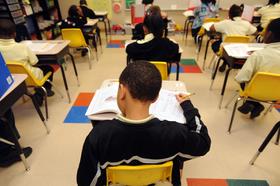Top Rankings
Freeport SD 145 School District ranks among the top 20% of public school district in Illinois for:
Category
Attribute
Diversity
Most diverse schools (Top 1%)
Community Size
Largest student body (number of students) (Top 1%)
For the 2025 school year, there is 1 public middle school serving 479 students in Freeport SD 145 School District. This district's average middle testing ranking is 1/10, which is in the bottom 50% of public middle schools in Illinois.
Public Middle School in Freeport SD 145 School District have an average math proficiency score of 11% (versus the Illinois public middle school average of 24%), and reading proficiency score of 10% (versus the 29% statewide average).
Minority enrollment is 61% of the student body (majority Black), which is equal to the Illinois public middle school average of 61% (majority Hispanic).
Overview
This School District
This State (IL)
# Schools
8 Schools
1,600 Schools
# Students
3,638 Students
621,275 Students
# Teachers
279 Teachers
47,956 Teachers
Student-Teacher Ratio
13:1
13:1
Student By Grade
District Rank
Freeport SD 145 School District, which is ranked within the bottom 50% of all 864 school districts in Illinois (based off of combined math and reading proficiency testing data) for the 2022-2023 school year.
The school district's graduation rate of 71% has decreased from 82% over five school years.
Overall District Rank
#767 out of 865 school districts
(Bottom 50%)
(Bottom 50%)
Math Test Scores (% Proficient)
12%
27%
Reading/Language Arts Test Scores (% Proficient)
14%
30%
Science Test Scores (% Proficient)
36%
50%
Graduation Rate
71%
87%
Students by Ethnicity:
Diversity Score
0.72
0.71
% American Indian
n/a
n/a
% Asian
1%
5%
% Hispanic
16%
30%
% Black
26%
22%
% White
42%
39%
% Hawaiian
n/a
n/a
% Two or more races
15%
4%
All Ethnic Groups
District Revenue and Spending
The revenue/student of $19,799 in this school district is less than the state median of $21,990. The school district revenue/student has stayed relatively flat over four school years.
The school district's spending/student of $20,065 is less than the state median of $21,244. The school district spending/student has stayed relatively flat over four school years.
Total Revenue
$72 MM
$41,381 MM
Spending
$73 MM
$39,976 MM
Revenue / Student
$19,799
$21,990
Spending / Student
$20,065
$21,244
Best Freeport SD 145 School District Public Middle Schools (2025)
School
(Math and Reading Proficiency)
(Math and Reading Proficiency)
Location
Quick Facts
Rank: #11.
Freeport Middle School
(Math: 11% | Reading: 10%)
Rank:
Rank:
2/
Bottom 50%10
701 W Empire St
Freeport, IL 61032
(815) 232-0500
Freeport, IL 61032
(815) 232-0500
Gr: 7-8 | 479 students Student-teacher ratio: 13:1 Minority enrollment: 61%
Recent Articles

Why Single-Sex Public Schools are Growing in Popularity
This article examines the growing trend of single-sex public schools in the United States. It explores the potential benefits, research findings, and controversies surrounding gender-specific education, as well as the factors driving its increasing popularity among parents and educators.

When Teachers Cheat: The Standardized Test Controversies
Teachers across the country are being accused of cheating on standardized tests, using erasers to conveniently change their students’ answers. However, are these teachers driven to cheat because the funding system is flawed?

When Field Trips Turn Deadly: Who is Responsible?
Recent deaths during field trips have parents and school officials questioning the safety of these excursions. Learn about these tragedies and what parameters should be in place to ensure a safe field trip.





